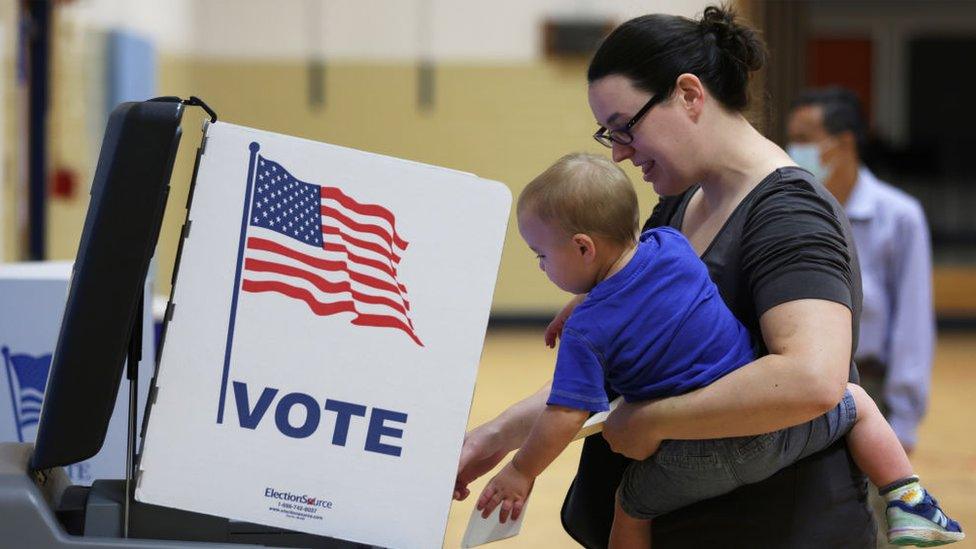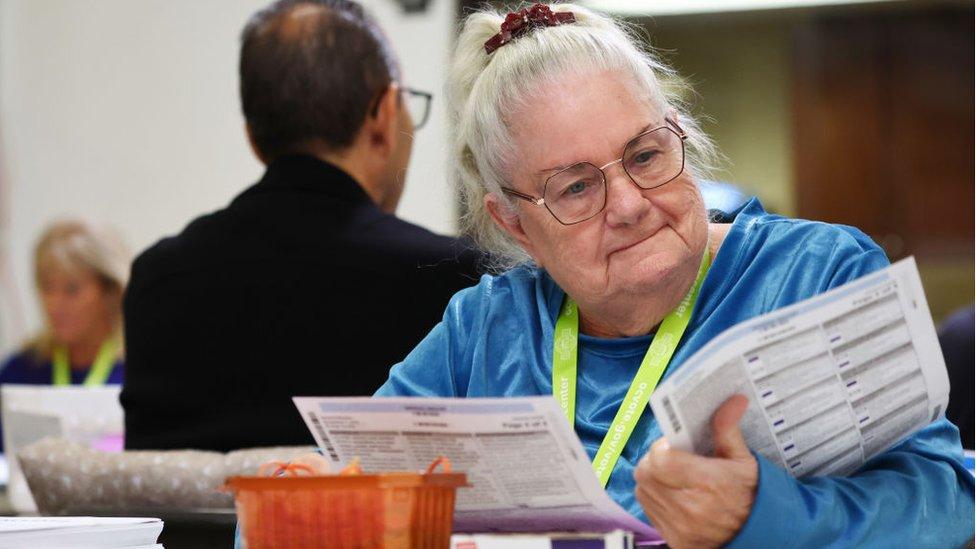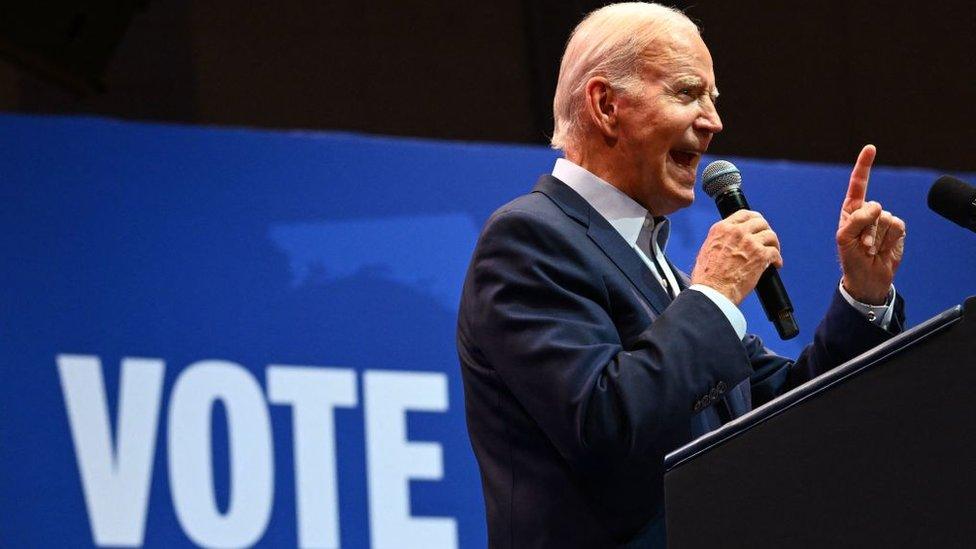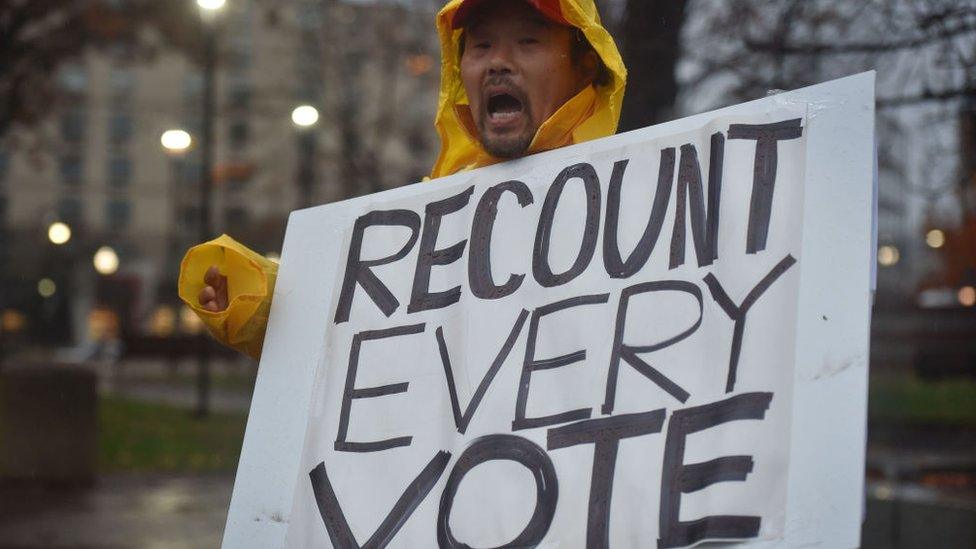US midterms: How will new voting laws affect the election?
- Published

Since the 2020 US presidential election, new voting restrictions have been introduced in many states across the country.
Proponents of the changes, enacted largely in Republican-run states, say they're necessary to prevent fraud at the polls.
But Democrats say they make it harder for voters to cast their ballots, disenfranchising poorer, marginalised communities.
What changes have been made?
The 2020 election was held during the Covid pandemic, and voting rules were temporarily relaxed (expanded) ahead of polling to make it easier and safer for people to vote.
This contributed to record turnout levels, external. Since then, many states have made these voting changes permanent.
But some backers of former President Donald Trump falsely claim that as a result, there was widespread voter fraud in the 2020 election which, they say, contributed to President Biden's victory.
Since 2020, lawmakers have proposed hundreds of voting restriction bills, and dozens have passed into law, including measures:
Limiting mail-in (postal) voting
Expanding voter ID requirements
Reducing the number of voting locations
Shortening voting times
Removing inactive voters from voter rolls
Increasing voter supervision
Twenty US states have passed laws that restrict voting, according to a report by the Brennan Center for Justice, external.

More voting restrictions were introduced in 2021 across the US than in any year since the Brennan Center for Justice began its monitoring a decade ago.
And the trend has continued this year in the build up to the midterm elections on 8 November.
"Over the past two years, we have seen a divide develop and deepen across the country. While many states have enacted laws to expand ballot access, others have made it more difficult to vote," says Liz Avore, a voting policy expert.
Some of the most wide-ranging voting restrictions have been in the Republican-controlled states of Texas, Georgia, Iowa and Florida.
These include a law in Texas under which election officials can face up to two years in jail for sending mail-in ballots to people who do not specifically request them.

Workers process postal ballots in California before election day
"Mail voting epitomises the national divide," says Ms Avore.
"Nevada, for example, recently started sending mail ballots to all voters. Meanwhile, Florida, Georgia, and Texas all erected new ID requirements that have made it more difficult for voters to vote by mail."
Another area which has seen significant changes is around poll watchers, who monitor the voting process.
Their role has had increased attention following former President Trump's allegations that they were blocked from entering polling sites in 2020.
They now will have far greater authority in some states. For example, a law passed in Texas limits the ability of election officials to remove poll watchers for disruptive behaviour - with potential criminal penalties if they do so.
Who is most affected?
Democrats say the restrictive laws are aimed at making it harder for those who traditionally back their party to vote.
The Brennan Center for Justice says some restrictive laws make it harder for people with disabilities and language-access barriers to vote, as rules on providing ballot assistance have been tightened.

President Biden has accused Trump-backing Republicans of undermining democracy
ID restrictions also disproportionately affect poorer communities, says Elaine Kamarck, who specialises in voting rights at US research group Brookings.
"A lot of poor people don't have a driver's licence because they don't have a car.
"Every restriction you place on people's ability to vote hits poor people harder and more directly because rich people have more time and access to manoeuvre through a bureaucracy."
Why have these laws been put in place?
Backers of former President Trump argue that tighter restrictions are needed to restore electoral integrity and prevent the sort of voter fraud which he claims took place in 2020.


However, no evidence has been found that voter fraud had any impact on the result in 2020, despite several investigations and audits.
A review by the Associated Press, external of every potential case of voter fraud in the six battleground states disputed by Mr Trump found fewer than 500 contested ballots. President Biden won those states by a combined total of more than 300,000 votes.
There have also been several audits and recounts in key states, all of which reaffirmed President Biden's win.
A particular target of those calling for restrictions has been mail-in (postal) voting, expanded in 2020 to make it easier to vote during the pandemic.
There is, however, no evidence mail-in voting led to increased fraud in the 2020 election.

There were protests following the outcome of the 2020 election
Federal Election Commission head Ellen Weintraub has said: "There's simply no basis for the conspiracy theory that voting by mail causes fraud."
Some Republicans have also expressed concerns that a permanent expansion of mail-in voting would favour Democrats - but numerous studies have found, external little evidence that postal ballots help one party over another.
